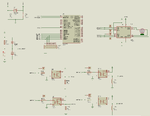milan.rajik
Banned

- Joined
- Apr 1, 2013
- Messages
- 2,524
- Helped
- 540
- Reputation
- 1,078
- Reaction score
- 524
- Trophy points
- 1,393
- Activity points
- 0
I have written a Stepper Motor code but it is not working as expected.
My Stepper is a 12V Bi-Polar type. RPM is 360 and step angle is 1.8.
For full 360 rotation I need to step 360 / 1.8 = 200 steps.
In my project I only need to rotate +/- 90, +/- 180.
The motor rotates in these sequence
a) +90 and then -90
b) +90 and then +90 and than -180
c) -90 and then +90
d) -90 and then -90 and then +180
e) +180 and then -180
these sequences (a, b, c, d, e) can occur in any any random way that is...
if a occurs first then a, b, c, d, e can occur again
similarly
if b occurs first then again a, b, c, d, e can occur
The code I have written is given below.
I need 50 steps for 90 and -90 and 100 steps for 180 and -180 degrees.
It works fine for 90 and -90 but not for others.
I am saving the previous step executed in a static variable so that when the RUN_STEPPER() is called another time then previous step is executed again that is
there are 4 pulse sequence
0x10
0x40
0x20
0x80
as I am using upper 4 bits of PORTB
If previous pulse was 0x20 than in the previous step value will be 2 and next function call 0x20 is again executed first and stepper moves either in CW or CCW.
eg: lPreviousStep = 2
In next function call for direction 1 (CW)
lRequiredSteps will be 50 + 2 = 52
52 % 4 = 0
lSteps = lPreviousStep; (lStep will be assigned 2)
loops from 2 to 52 = 50 loops
lCurrStep = lSteps % 4; (loop 1st time, 2 % 4 = 2)
So case 2 of Step_Motor() is executed which is the same step which was executed as the last pulse sequence when RUN_STEPPER() was called previously.
But the code is working erratically. It turns 90 and then -90 and when it turns 180 again the angle is wrong.
My Stepper is a 12V Bi-Polar type. RPM is 360 and step angle is 1.8.
For full 360 rotation I need to step 360 / 1.8 = 200 steps.
In my project I only need to rotate +/- 90, +/- 180.
The motor rotates in these sequence
a) +90 and then -90
b) +90 and then +90 and than -180
c) -90 and then +90
d) -90 and then -90 and then +180
e) +180 and then -180
these sequences (a, b, c, d, e) can occur in any any random way that is...
if a occurs first then a, b, c, d, e can occur again
similarly
if b occurs first then again a, b, c, d, e can occur
The code I have written is given below.
I need 50 steps for 90 and -90 and 100 steps for 180 and -180 degrees.
It works fine for 90 and -90 but not for others.
I am saving the previous step executed in a static variable so that when the RUN_STEPPER() is called another time then previous step is executed again that is
there are 4 pulse sequence
0x10
0x40
0x20
0x80
as I am using upper 4 bits of PORTB
If previous pulse was 0x20 than in the previous step value will be 2 and next function call 0x20 is again executed first and stepper moves either in CW or CCW.
eg: lPreviousStep = 2
In next function call for direction 1 (CW)
lRequiredSteps will be 50 + 2 = 52
52 % 4 = 0
lSteps = lPreviousStep; (lStep will be assigned 2)
loops from 2 to 52 = 50 loops
lCurrStep = lSteps % 4; (loop 1st time, 2 % 4 = 2)
So case 2 of Step_Motor() is executed which is the same step which was executed as the last pulse sequence when RUN_STEPPER() was called previously.
But the code is working erratically. It turns 90 and then -90 and when it turns 180 again the angle is wrong.
Code C - [expand]

